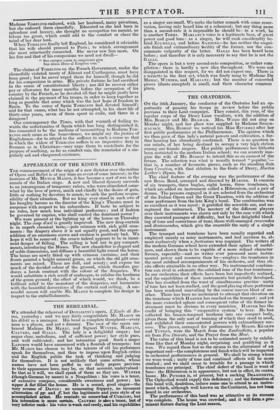THE ORATORIOS.
ON the 30th January, the conductor of the Oratorios had an op- portunity of passing his troops in review before the public previous to their Lent campaign. They consist, this year, of the regular corps of the Drury Lane vocalists, with the addition of Mrs. BISHOP and Mr. BRAHAM. Mrs. Wean did not sing on Monday night, and her place was supplied by Madame STOCK- HAUSEN. Mrs. BISHOP we noticed (as Miss RIVIERE) after her first public performance at the Philharmonic. The opinion which we then gave of this lady's natural powers and cultivation, a fur- ther hearing has abundantly confirmed. There is no question in our minds, of her being destined to occupy a very high station among our female singers. Her public performance has hitherto been restricted to the modern Italian school; we can scarcely ima- gine the wife of Mr. BISHOP to intend this as an earnest of the future. The selection was what is usually termed " popular,"— that is, a number of favourite pieces, such as the standing dish from Creation, with that oblation to the Gods of Drury, Martin Luther's Hymn, &c.
The chief feature of the evening was the performance of the new Brass Band, arranged and directed by HARPER. It consists of six trumpets, three bugles, eight horns, three trombones, to which are added an instrument called a Hibernicon, and a pair of drums. The persons engaged in it are selected from the orchestras of the Italian Opera and the Great Theatres, with the addition of some performers from the late King's band. The combination was as excellent as it was novel: it gratified the scientific ear, and en- raptured the unlearned. The mastery of the different players over their instruments was shown not only by the ease with which they executed passages of difficulty, but by that delightful blend ing of tone and correctness of tune, those well-managed crescendos and diminuendos, which give the ensemble the unity of a single instrument.
The trumpet and trombone have been usually regarded and employed merely as noisy instruments, and had recourse to, al- most exclusively when a fortissimo was required. The writers of the modern German school have extended their sphere of useful- ness, and shown them to be capable of a more refined character SPOHR, especially—and no writer ever possessed more instru- mental power and resource than he—employs the trombones in the most subdued accompaniments of his orchestra, and thus eli- cits effects attainable in no other way. No instrumental combina- tion can rival in solemnity the subdued tone of the four trombones .. In our orchestras their effects have been but imperfectly realized, and the capabilities of these instruments but partially developed. This has resulted from the want of simultaneous practice • unity of tone has not been studied, and the good playing of one performer has been rendered unavailing by the coarse uneven blast of an- other. There has been no incitement to attempt that elevation on the trombone which HARPER has reached on the trumpet; and yet the more extended sphere and consequent value of the former in- strument must be obvious to every musician. HARPER has the credit of bringing this "cooperative system" to bear. He has collected his brazen-tongued brethren into one compact body, given them the only sort of training of which they stood in need, and exhibited their concentrated powers with extraordinary suc- cess. The pieces, arranged for performance by Messrs. ICEAaNs and TUTTON, were the March from the Zauberliiitte, a popular air from Fra Diavolo, and the Prayer from the More. The value of this band is not to be estimated merely by exhibi- tions like that of Monday night, surprising and gratifying as it was. We regard these but as the means to the attainment of an important end—the completeness and finish which will be imparted. to orchestral performances in general. We shall be strong where we were weak ; unity of tone and combined effects will be more studied ; and we shall cease, to tremble for a passage in which trombones are principal; The chief defect of the band is want of bass; the Hibernicon is in appearance, but not in effect, its contra basso. Mr. PONDER is, at present, but a sucking DaAa0NErri.. The Ophyclied would supply this deficiency; and the formation of this band will, doubtless, induce some one to attend to an instru- ment which, although well known on the Continent, has not bees heard in our orchestras.
The performance of this band was as attractive as its success was .complete. The house was crowded; . and it will formalre-. minent feature during the Lent season.


























 Previous page
Previous page